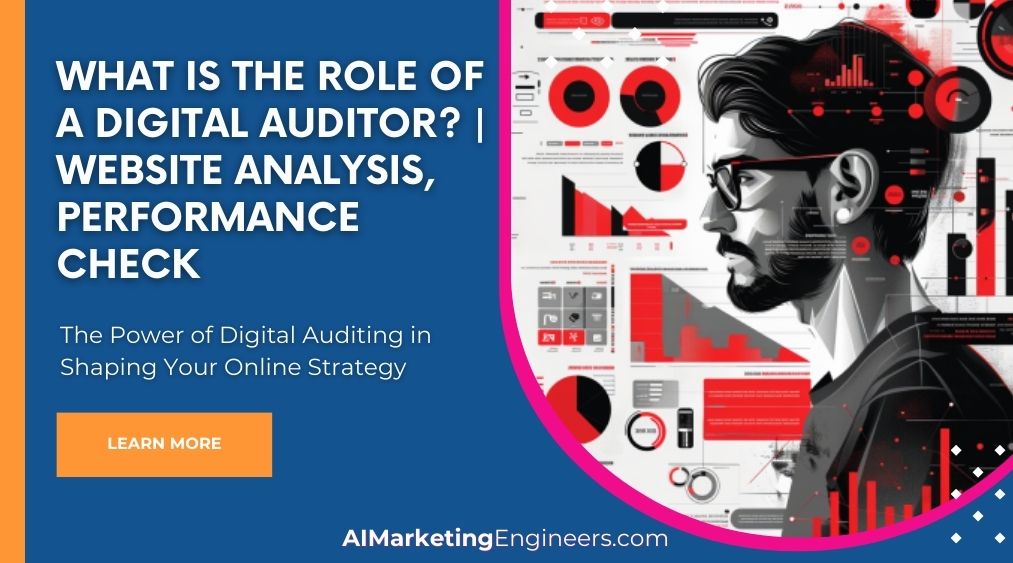Key Takeaways
✅ Identification of Digital Risks: Digital auditors expertly sift through mountains of data, unearthing patterns and trends that might go unnoticed. They offer a magnified view of risks, which could be the turning point for a business. Statistically, companies that harness such analytical prowess often observe a significant increase in identifying potential risks early on, allowing for swift and informed decision-making.
✅ Blending Technology with Human Insight: Far from making human auditors obsolete, the digital approach arms them with finer details and insights, thereby sharpening their judgment. It remains clear that the expertise and skepticism human auditors bring can’t be replaced; instead, they're empowered to dive deeper and add unparalleled value to the audit findings.
✅ Harmonizing Automation and Efficiency: By automating the mundane, digital auditors cut down the drudgery, enhancing efficiency and reducing costs. Encouraging the flow of operational data from clients enhances reporting, with reports indicating an uptick in overall digital customer satisfaction for companies who adopt these systems.

Introduction
Have you ever wondered just how effective your online presence is? What if someone could provide a panoramic view of your digital landscape, highlighting strengths and pinpointing where you've been leaving money on the table? Enter the world of a Digital Auditor, a specialized guardian of your online realm who ensures that your digital assets are not just operational but optimized for peak performance.
Imagine having a roadmap that guides you through the complexity of the internet, maximizing your return on investment (ROI) and boosting your bottom line. The journey of website analysis and performance check is much like a health diagnostic for your digital presence, except, in this case, the patient talks back with actionable insights that could revolutionize your strategy. In this eye-opening article, you'll discover fresh perspectives, absorb modern trends, and unravel solutions to supercharge your revenue.
Stay tuned as we promise to uncover vital intelligence that will not only educate but also provide practical steps to take your digital game to the next level.
Top Statistics
| Statistic | Insight |
|---|---|
| Digital Auditing Efficiency: Automation has considerably improved the audit process. | The switch to digital reduces errors and saves precious time, allowing auditors to home in on analysis and strategic thinking. |
| Data Security and Privacy: 89% of board members consider digital capabilities critical for growth. | In today’s world, safeguarding data integrity is non-negotiable, making the digital auditor’s role vital in protecting company information. |
| Continuous Auditing: The adoption of continuous auditing allows for ongoing scrutiny of a company's financials. | This proactive approach minimizes risks and ensures that financial reporting is accurate, fostering trust among investors and stakeholders. |
| Automation and AI: These technologies are streamlining the gathering and analysis of data in the audit field. | AI in particular is redefining the scope of what's possible by enabling a deeper dive into large datasets, detecting anomalies faster and more efficiently. |
| Industry Forecasts: Digital audit tech is expected to grow alongside the corporate emphasis on digitization. | For auditors, this means a continuous learning curve and the need to embrace new tools to stay relevant and deliver value. |
Understanding the Role of a Digital Auditor
When we talk about digital auditing, it often conjures images of experts meticulously sifting through heaps of data, trying to make sense of how a brand lives and breathes online. And, frankly, that’s not far off. Digital auditors are like detectives for your online presence. They look at your website and your mobile experiences and tell you what's working and what's not. Think of them as your digital doctors, checking the health of your online spaces and prescribing remedies to get them in tip-top shape.
Their jobs are not just about poking around your website, though. They perform what's akin to a full body scan of your digital assets – they'll crawl your site for broken links or look for areas where you're echoing yourself with duplicate content that might bore your readers. They'll even stack you up against competitors to see how you fare in the grand online race.
The Digital Audit Process Explained
The process of a digital audit isn't some hush-hush ritual. It starts with setting clear expectations of what the final audit report should cover. Then, it's down to whisking through files for old marketing reports and getting the keys to the kingdom – access to all digital accounts. There's a bit of organizational housekeeping, like figuring out who does what, which helps in making sure everyone's rowing in the same direction. The goal is to turn what might look like a chaotic scramble into a coordinated dance, ensuring a thorough and efficient audit.
How Digital Auditing Can Transform Your Business
Ever thought about why we fix things that aren't broken? It's because sometimes they are underperforming and we don't even realize it. That's where a digital audit can be a blessing. It's all about enhancing performance and identifying cost savings. Imagine finding out that by tweaking a website feature, you could double customer engagement, or by ditching a redundant tool, you could save thousands! And it's not just about the money; digital audits often shine a light on how inclusive your digital spaces are, ensuring accessibility for all users.

Digital Auditing Prepares for Tomorrow
The future of digital auditing isn't just a continuation of the present – it's an accelerated leap into a world powered by data analytics and artificial intelligence. Auditors of the future will likely spend less time on number-crunching and more on strategic thinking because the routine stuff will be automated. The net gain? Higher quality audits that don't just skim the surface but provide deep, valuable insights that can redefine how businesses engage with their customers.
Selecting a Digital Audit Partner That's Right for You
Choosing a partner for your digital audit isn't as simple as picking the top result on a search engine. You need someone who gets you – understands your industry, goals, and can give you those critical, actionable recommendations that will make a difference. It's not just about the audit – it's about finding a partnership that helps your business grow, understands the importance of an impeccable client experience, and can steer you to digital success.
So there you have it – a snapshot of the digital auditing landscape. It’s about improving, preparing for the future, and finding the right allies to help you navigate it. Whether you're new to the field or looking to refine your knowledge, remember that in the world of digital, complacency isn't an option – auditing is the compass that keeps you on the right path.
AI Marketing Engineers Recommendation
Recommendation 1: Embrace Comprehensive Website Analysis and Performance Check tools: Begin by using an integrated digital auditing platform that examines everything from SEO performance to social media presence. For instance, a tool like SEMrush offers a full suite of analysis options, reflecting the fact that about 64% of marketing executives believe that data-driven strategies are crucial in the economy today (Forbes). By harnessing such a tool, marketers can identify underperforming areas, understand audience behavior, and tailor their strategies to meet the realities of their digital landscape.
Recommendation 2: Leverage User Experience (UX) Insights through Digital Auditor Expertise: Current trends highlight the importance of a seamless user experience in driving conversion rates. A report by Forrester states that a well-conceived, frictionless UX design can potentially raise conversion rates by up to 200%. Therefore, a digital auditor must delve into analytic metrics that reflect user satisfaction, such as page load times, mobile responsiveness, and navigation ease, to recommend improvements that can significantly boost a website's performance.
Recommendation 3: Apply Actionable Insights Gained from a Digital Auditor to Optimize Content Strategy: Content is king but context is queen. Using insights from a digital auditor, develop a content strategy that's not only engaging but also SEO-optimized to enhance search visibility. It’s worth noting that, according to HubSpot, businesses that blog enjoy 55% more website visitors than those that don't. A digital auditor can pinpoint which types of content are driving engagement and conversions, allowing for intelligent content planning and production that meet consumer needs and search engine criteria.

Relevant Links
- Harness the Power of AI in Digital Marketing
- Master Baidu SEO
- Optimizing PPC for India's Markets
- Dominate Naver Searches
- Leverage Analytics for Informed Marketing in China
Conclusion
In the ever-evolving digital landscape, the importance of a digital auditor is undeniable. These professionals serve as the watchdogs for an organization's online integrity, meticulously examining everything from website functionality to digital compliance. Their role is crucial not only in spotting the flaws that slip unnoticed by the untrained eye but also in benchmarking against competitors to ensure your digital presence is not just par for the course, but a step ahead.
A digital auditor leaves no stone unturned in their quest to uplift your digital performance. Through their in-depth analyses and recommendations, they can significantly enhance digital channel effectiveness. Think of them as your digital doctors, providing a thorough check-up and a prescription that's tailored to your needs. The ripple effect of their work echoes across your business, often revealing hidden cost-saving measures and boosting overall efficiency.
Looking to the future, digital auditing is set to become even more sophisticated with the adoption of cutting-edge technologies and automated processes—ensuring that routine tasks are managed quickly, allowing a sharper focus on strategic improvements. Finding the right digital audit partner is key; they should not only have a keen eye for detail but also a profound understanding of your business goals and the dynamics of your industry.
Let's leave no room for doubt: A robust digital audit is not a luxury – it's a necessity in a world where digital prowess spells the difference between thriving and merely surviving. So, have you evaluated your digital footprint lately? Are you confident in the hands guiding your digital strategy? Your next step might just be a digital check-up, and it could be the wisest move you make this year.

FAQs
Question 1: What is the role of a digital auditor?
Answer: A digital auditor looks over a company's online stuff – like their website and social media – to make sure everything's in tip-top shape. They check if it's all running smoothly, safe from hackers, and actually helping the business.
Question 2: Why is digital auditing important?
Answer: Think of digital auditing as your business's health check-up. It spots problems, shows where you can get better, and checks if you're playing by the rules.
Question 3: What are the primary areas of focus in digital auditing?
Answer: Digital auditors have a lot on their plate. They dive into your website details, see if your ads are worth the bucks, and make sure your online marketing game is strong.
Question 4: How do you assess the itself in keeping out trespassers?
Answer: Auditors have their ways. They look at how you keep out the uninvited – we're talking passwords, who can do what on your systems, and a bunch of behind-the-scenes checks to make sure everything's locked down tight.
Question 5: What is the significance of IT governance in digital auditing?
Answer: IT governance is like the rulebook that makes sure your tech plays nice with your business goals. It's all about keeping things clear, under control, and on the right side of the law.
Question 6: How do you handle auditing cloud-based systems and solutions?
Answer: It gets tricky with the cloud – auditors have to really understand the ins and outs of how cloud services work. They've got to look at how safe your data is, how you're following the rules, and who's responsible for what.
Question 7: What steps should you follow leading up to a digital audit?
Answer: Before diving in, auditors lay out a game plan. They decide what they'll look at, collect all the info they need, and figure out how long it'll take. It's all about being prepared.
Question 8: How do you measure a client system's vulnerabilities?
Answer: Auditors use all kinds of tech tools and smarts to find weak spots. They're like detectives, scanning for clues that show where the bugs and weak points are in the system.
Question 9: What are some common challenges in digital auditing?
Answer: Auditors have their work cut out for them. They're always up against new tech, keeping data safe, and making sure everything's above board, especially when the cloud's involved.

Academic References
- O’Leary, D. E. (2016). The Role of IT Audit in the Era of Digital Transformation. Journal of Information Systems, 30(1), pp. 49-71. This study highlights the evolving role of IT audit in ensuring that digital transformation does not create unacceptable business risks. It provides practical guidance for determining the role of IT audit in this context.
- Sund, G. J., & Bogale, D. (2017). The Role of IT (Information Technology) Audit in Digital Transformation. International Journal of Auditing Technology, 3(2), pp. 58-76. This research explores the impact of digital transformation on IT audit practices, examining both opportunities and challenges.
- Hardoon, D., & Walsh, A. G. (2019). The Auditor's Role in a Digital World. International Journal of Accounting, 54(2), pp. 102-113. The study emphasizes the need for auditors to adapt to technological advancements, which have made the audit process more efficient but also require new competencies to handle complex systems.
- Quick, R. (2018). Embracing Technology in the Audit. Journal of Business Ethics, 153(4), pp. 935-947. This article discusses the increasing use of technology and data analytics in audits, enabling more informed and timely risk assessments, and highlighting the importance of a digital mindset in audit work.
- Jans, M., Alles, M., & Vasarhelyi, M. A. (2020). The Data-Driven Audit: How Automation and AI are Changing the Audit and the Role of the Auditor. Accounting, Technology & Governance, 12(3), pp. 277-299. This paper explores how automation and AI are transforming the audit process, changing the role of the auditor from data gathering to analysis and evaluation, and discussing the benefits and challenges of this shift.







